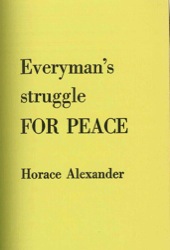Synopsis
The author, an internationally known leading member of the Religious Society of Friends and a convinced advocate of the way of peace, seeks to awaken the conscience of men of true devotion to truth and righteousness to work courageously with “reckless abandon to liberate all men from fear and hate, from oppression and war.”
About the Author(s)
Horace Alexander (1889-1989) dedicated his life to a concern about the relationship between England and India. He carried out this work in the spirit of Friends and it is a testimony to his success that he arranged for Mohandas Gandhi to attend a Quaker meeting while the Indian leader was in England negotiating for independence. This experience encouraged Gandhi to incorporate silent meditation into the prayers carried out at his ashram. Horace was born into Quakerism in Croydon, England. He attended Kings College, Cambridge and spent many years teaching at the Quaker study center, Woodbrooke. His friendship with Gandhi began during a trip to India in 1928, and Horace later brought him to spend a week at Woodbrooke. His interest in India did not end with his understanding of the movement for independence; he also worked with the Friends Ambulance Unit in India during the Second World War. He wrote Quakerism and India, which considers the history of colonialism, missionary work and Quaker service in India, asking how Friends should try to make a just and sustainable impact on that country. He considered returning to India and making it a permanent residence, but decided that he needed to devote himself to explaining India to the west. This provided him with the inspiration for writing India through Western Eyes. In addition to his interest in India, Horace was a devoted bird-watcher; he developed his own system for tracking migratory birds at age eight and continued this work well into his eighties, when he published Seventy Years of Bird Watching.
Pendle Hill Pamphlet #74






